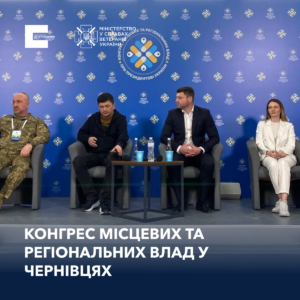The Congress of Local and Regional Authorities was held in Chernivtsi under the chairmanship of President of Ukraine Volodymyr Zelenskyy. One of the panel discussions at the congress was devoted to veterans’ policy and support for the Armed Forces of Ukraine. In particular, they raised the issue of mobilization and effective manning of the Armed Forces. They also discussed the needs of combatants and war veterans.
The discussion Policy of Heroes and support for the Armed Forces was moderated by Vice Prime Minister of Ukraine Iryna Vereshchuk.
“Our heroes and their families need to understand the strategy the state is developing to support them and feel its implementation. And it is important for society to respect active servicemen and pay tribute to the fallen soldiers,” said Iryna Vereshchuk.
Other speakers included Acting Minister of Veterans Affairs Oleksandr Porkhun and Acting Executive Director of the Ukrainian Veterans Foundation, Advisor to the Deputy Minister of Defense of Ukraine Ruslana Velychko-Tryfoniuk.
Who is responsible for the effectiveness of veterans’ policy
According to Oleksandr Porkhun, an effective veterans’ policy is the state’s area of responsibility to each and every one of them. To those who also took responsibility to the state and stood up for it.
“The involvement of local authorities at each stage of returning to public life is crucial, because today veterans are returning to their communities. We have to meet them with all the opportunities to support the Armed Forces of Ukraine, provide and improve services according to their needs, and attract investments for the development of veteran infrastructure,” said Porkhun.
According to Ruslana Velychko-Tryfoniuk, when we talk about respect for veterans, we are talking about the memorial complex, the construction of which is constantly facing obstacles. Because if a society cannot bury its heroes with honor, what can we expect from such a society? This is also a matter of our security and defense. After all, today all spheres of the country are primarily cogs in its defense and security.
“Over the two years of the Ukrainian Veterans Foundation’s work, our team, which includes veterans and their families, has built an organization with which veterans and civil society can communicate on a first-name basis and know that they will find a way out and step in any situation,” emphasized the acting executive director of the Ukrainian Veterans Foundation.
She also said that the Foundation has managed to start working on the formation of a network of NGOs that have received state support for the reintegration of veterans into civilian life. In addition, the Foundation supports veteran businesses, which always have a social component. Veterans become rehabilitation therapists or psychologists and open centers to help their fellow soldiers.
“The state cannot educate people, people are educated by social norms. However, the state can be a partner in this. An honest and equal partner who cares,” emphasized Ruslana Velychko-Tryfoniuk.


